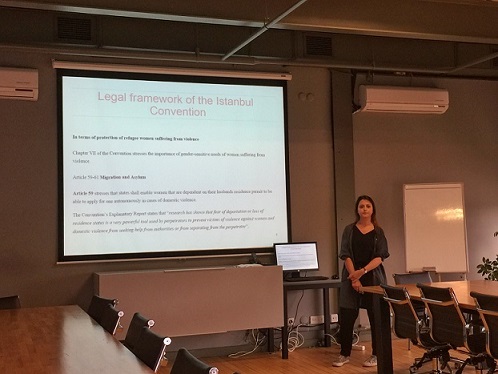Presentation by Sanela Ragipi on “Protecting Human Rights of Refugee Women in Europe under Istanbul Convention”, 17 May 2016

A presentation on “Protecting Human Rights of Refugee Women in Europe under the Council of Europe Convention on preventing and combating violence against women and domestic violence (Istanbul Convention)” was held on 17 May 2016 at Dolapdere Campus of Istanbul Bilgi University. The presentation was arranged by the Istanbul Bilgi University Human Rights Law Research Center and held by Ms. Sanela Ragipi, both a student at Linnaeus University in Sweden and a guest researcher at the Center. The presentation was attended by members of Human Rights Law Research Center and Faculty of Law and law students of the university.
Asst. Prof. Lami Bertan Tokuzlu opened the presentation by introducing the main topic. Sanela Ragipi presented a brief overview of the legal framework of the Istanbul Convention. She emphasized the importance of the Istanbul Convention as an international legally binding treaty promoting protection of refugee women’s rights. The issue of recognizing gender-based violence as a form of persecution within the meaning of the 1951 Refugee Convention was correspondingly addressed. She continued, then, with discussing the new broader definitions of gender and violence applied in the Istanbul Convention and the significance of implementing gender-sensitive asylum laws and gender-sensitive reception conditions and procedures for refugee women. Gender-sensitive asylum laws and reception conditions in three of the Council of Europe member states, Parties to the Convention (Germany, Sweden and Turkey) were also examined and discussed. She argued that, the Istanbul Convention can indeed fill in the gaps on legal norms in national legislation of asylum law. To conclude, she emphasized the importance of the Parties to the Convention of fully complying with their obligations under international law in order to guarantee the physical, psychological and sexual integrity of refugee women.
The presentation came to an end with a discussion with the members of the Center and students about national and international legislation on gender-based persecution and gender-sensitive interpretation of asylum law.

